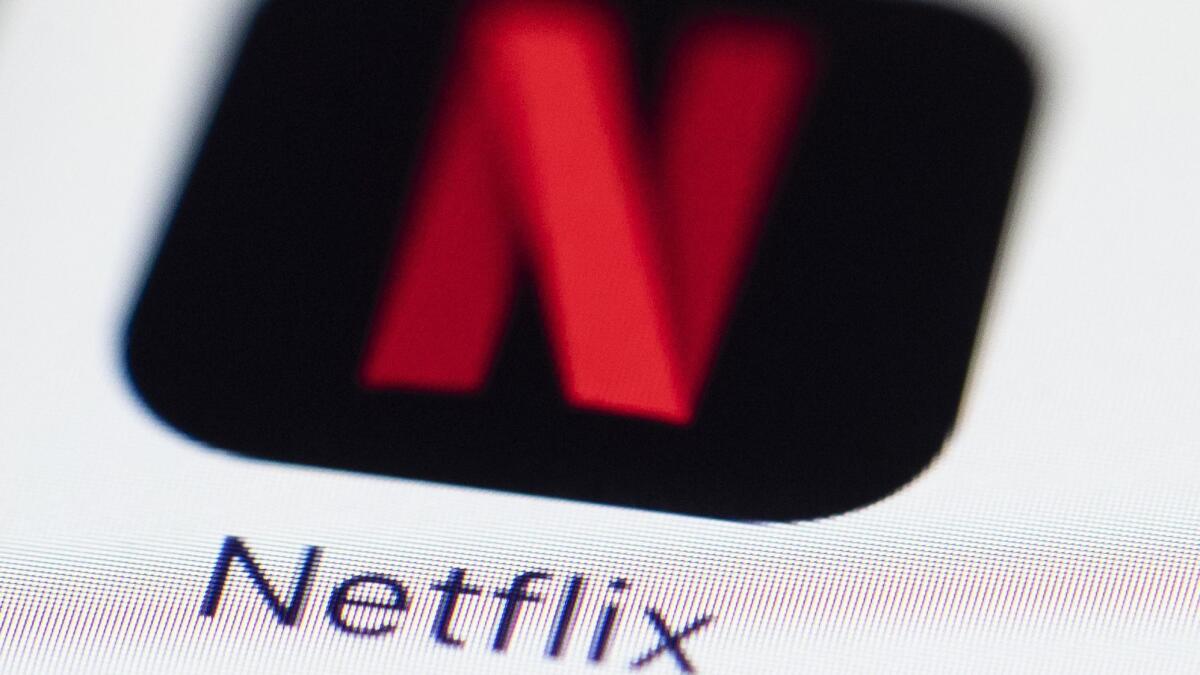Netflix shares soar in after-hours trading on robust quarterly earnings

- Share via
Netflix saw yet another stellar quarter, with robust international subscription growth driving the company to new highs.
The streaming entertainment giant added 7.4 million subscribers in the first quarter, easily beating expectations and sending shares of the company soaring 7% in after-hours trading Monday.
Netflix now boasts 125 million subscribers around the globe, a more than 25% jump from this time last year.
The Los Gatos, Calif., company posted first-quarter earnings of 64 cents a share, which was in line with estimates by analysts polled by Factset. Revenue for the period was $3.70 billion, slightly above analyst estimates of $3.69 billion.
Netflix said first-quarter revenue rose 43% year over year, the fastest pace in the history of its streaming business. One likely revenue driver was the recent price increase for subscribers, who saw the monthly price of a standard plan rise by $1, to $10.99.
Net income for the quarter was $290 million, up more than 60% from a year earlier.
Subscription growth once again came largely from international territories, including Latin America and Europe, as domestic subscriptions showed signs of plateauing. For the quarter, the company added 5.5 million subscribers in overseas markets, versus fewer than 2 million in the U.S.
In a note to investors Monday, Netflix attributed the 7.4 million new subscribers to the “growing breadth of our content and the worldwide adoption of internet entertainment.”
Analysts had expected the company to add 6.6 million subscribers in the period.
Netflix unveiled a number of high-profile shows during the quarter, including the new sci-fi series “Altered Carbon” and comedian Chris Rock’s stand-up special “Tamborine.” New seasons of “A Series of Unfortunate Events,” “Grace and Frankie” and “One Day at a Time” also premiered during the period.
During the period, Netflix shares soared past $300 for the first time, as investor optimism about the company’s subscriber base outweighed fears of competition from Walt Disney Co., which will be launching its own streaming entertainment service in 2019.
“The real key is whether consumers subscribe to more than one service,” said Michael Pachter, an analyst at Wedbush Securities, who covers Netflix. But he said Netflix’s prospects for continued overseas subscriber growth appear healthy.
“There is less competition, and the addressable market is 10 times or more the market in the U.S., so they should be able to continue to grow at a healthy clip.”
Netflix didn’t disclose which countries saw the most growth. Pachter said regions with the largest economies probably saw the healthiest subscriber traction, including Brazil, Western Europe and developed Asia.
Netflix shares fell $3.87, or 1.2%, to $307.78 on Monday, but jumped nearly 7% to $329.07 in after-hours trading.
Netflix is aiming to spend as much as $8 billion this year on content, up from $6 billion in 2017. The amount is expected to put it ahead of rivals Amazon and Hulu in spending on content.
The massive spending on content and rapid subscriber growth have made Netflix a draw for top Hollywood talent — and a growing source of anxiety among the major studios that face mounting competition from the streaming powerhouse.
During the quarter, Netflix pulled off a major coup by poaching TV producer Ryan Murphy from 20th Century Fox. The deal, which is believed to have cost Netflix $300 million, was the company’s latest salvo at traditional studios, showing that it is willing to spend big to lure away major talent.
Despite the strong quarterly results, Netflix said Monday it expects to continue generating negative free cash flow for several more years “as our original content spend rapidly grows.” To fund its rapid content development, which includes more self-owned original shows, the company has had to borrow billions of dollars.
“We will continue to raise debt as needed to fund our increase in original content,” Netflix said in the investor note, adding that it believes its debt levels are “quite modest” given the size of the company.
The company also addressed its ongoing fight with the Cannes Film Festival, which kicks off next month. Last year, Cannes organizers stated that future editions of the annual festival will require competition films to have a theatrical release in France.
This year, Netflix is refusing to allow any of its movies to be shown at Cannes. French regulations stipulate that movies cannot be made available for streaming until three years after their theatrical release.
“We would never want to do that to our French members,” the company said Monday. “We will continue to celebrate our films and filmmakers at other festivals around the world but unfortunately we will have to sit out Cannes for now so that our growing French membership can continue to enjoy our original films.”
Netflix has favored so-called day-and-date theatrical releases, in which movies are released simultaneously on its streaming platform and in a small handful of cinemas. The company plans to release 80 original films in 2018.
UPDATES:
4:50 p.m.: This article was updated to include additional details from the earnings call.
2:44 p.m.: This article was updated with comments from analyst Michael Pachter as well as additional details from Netflix’s earnings report.
This article was originally published at 1:35 p.m.
More to Read
Inside the business of entertainment
The Wide Shot brings you news, analysis and insights on everything from streaming wars to production — and what it all means for the future.
You may occasionally receive promotional content from the Los Angeles Times.











